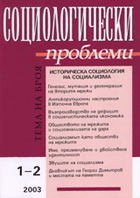Генезис, мутация и дегенерация на вторите мрежи
Genesis, mutation and degeneration of third networks
Author(s): Andrey RaychevSubject(s): Social Sciences
Published by: Институт по философия и социология при БАН
Summary/Abstract: In order to understand what is happening today, we need to return back to the social architectonics of the former regime. There, specific formations have arisen, called ‘second networks’ in the theoretical language of the 80s, reminiscent of the networks of the Western society but in the same time of a radically different nature, which later (after 1989) have outlined and determined the character, form, and model of the transformation. The author sketches a generalized picture of the main phases in the development of post-socialist network formations: their genesis in the ‘classical socialist system’, their mutation and defemeration in the period of so-called (‘postcommunist’ and ‘post-postcommunist’) ‘transition’. The text considers how a social structure emerging at the border between the economic shortage (Janos Kornai) and the power shortage (Deyan Deyanov) functions as a non-market, ‘acrhaic’ game of exchanges, a kind of ‘colonization of the state by the family and country-fellowship ties (Ivo Mozny), and, together with a part with the then elites that serve it (the nomenklatura and the intelligentsia), mutates, in decomposing the social organizm and in recruiting a new postcommunist elite. The basic indicator of the degeneration of the second network is the change of its vertical-horizontal character into a strictly horizontal one. This took place under the pressure of the emerging market economy. Thus the network has ceased to be a global formation and has become corporativized. Its family-kinship-countryfellow basis has almost been eliminated. In the conditions of market economy it implodes, and finally its degeneration ends up not in a death, because there will always be some kind of network formations, but in a fragmented network functioning as a subsystem of already a different society.
Journal: Социологически проблеми
- Issue Year: 35/2003
- Issue No: 1-2
- Page Range: 5-13
- Page Count: 10
- Language: Bulgarian
- Content File-PDF

